–
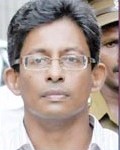
J.S. Tissainayagam
The government of Sri Lanka is leaving no stone unturned in an attempt to annul provisions of the country’s constitution that are key to implementing post-war reconciliation. By seeking to rescind the 13th amendment, long held by the international community as the starting point for a political solution for the conflict between Sinhalese and Tamils, the Government has clearly demonstrated its cavalier disregard to UN resolutions and international treaties and therefore is an unreliable international actor.
A spokesperson to India’s Ministry of Foreign Affairs was candid when he said, “[t]he proposed changes raised doubts about the commitments made by the Sri Lankan government to India and the international community, including the United Nations, on a political settlement in Sri Lanka that would go beyond the 13th Amendment.”
The 13th amendment to Sri Lanka’s constitution was introduced as an instrument to share power between the Sinhalese and Tamils through devolution to the country’s provinces. The amendment flowed from the Indo-Lanka Accord, negotiated and signed as a treaty between the governments of India and Sri Lanka in 1987, in a bid to end the armed struggle between rebels supported by India and the Sri Lanka government.
Devolution to share power between Sinhalese and Tamils was to soon encounter snags. The fundamental reason was that Tamils realised that devolution proposed under the 13th amendment would be hobbled by the very thing it was supposed dismantle – power wielded in Sri Lanka’s legislature by Sinhalese members of parliament.
This constraint was due to the unitary character of the Sri Lankan state. This means that the central government, in which the executive presidency and parliament are key institutions, remains constitutionally supreme. Under a unitary system even when power to legislate over subjects of local importance is devolved to subunits such as provinces, parliament can override those powers either by a simple majority or a two-third majority. This contrasts with federal constitutions where powers that the constituting units enjoy are so entrenched that they cannot be tampered with by central governments so simply. Needless to say in the real world constitutions mostly fall in between the unitary-federal continuum.
Despite devolution under the 13th amendment being hobbled by control from the central parliament, most of the Tamil political parties and armed rebel groups accepted the Accord and the brand of power sharing it proposed. Despite backing by Colombo and New Delhi, devolution to the PCs under the 13th amendment, which became law in 1988, was only implemented selectively. For instance, elections to the Northern Provincial Council (NPC) where a majority of Tamils live, was never held. Second, a clause to merge the Eastern PC which has over 60% Tamils and Tamil-speaking Muslims with the NPC to strengthen common demands was temporarily implemented but later struck down by the Supreme Count as unconstitutional.
Following the military defeat of the LTTE in May 2009, devolution of power came back into currency as a practical mechanism of devolving power and thereby promoting reconciliation between the Tamils and Sinhalese. At the same time the international community – especially India and the US – expanded their role in promoting conflict resolution in Sri Lanka.
Citing the provisions of the Accord, the treaty between Sri Lanka and India, New Delhi called for the full implementation of the 13th amendment, which was echoed by the US and other sections of the international community. But buoyed by its military victory and elements of Sinhala nationalist elites, the Sri Lankan government prevaricated. Following three years of intensifying misery for the Tamils due to militarisation, widespread allegations of disappearances, torture and rape, loss of livelihood and parlous conditions of resettled IDPs, the United States moved two resolutions in the UN Human Rights Council. The second resolution, adopted in March this year, “welcomed” provincial elections for the NPC.
Faced with mounting international pressure the government has indicated its intention to hold polls for the NPC this year, although it is yet to be officially announced at the time of writing. However fearing that such elections would strengthen the Tamils in the North the government has on the backs of Sinhala nationalist groups begun to demand dismantling of even the vestiges of devolved governance. It has therefore proposed a 19th amendment to ensure that provincial governance is in name only. The government’s group of Sinhala representatives in Parliament is expected to back this bill and pass it with ease.
The Sri Lankan government’s move to dilute the 13th amendment only reiterates its indifference to reconciliation. It also shows up very clearly the inadequacies in the strategy of the international community. The international community expects Colombo to respect international laws or conventions – such as UN resolutions and treaties – and that meaningful sharing of power will come from within Sri Lanka under the present political structures. But that is not forthcoming. The international community should therefore strengthen the Tamils within and outside Sri Lanka and use other diplomatic tools available to it to resolve the Sri Lankan conflict. A delay will only exacerbate Tamil desperation and see a further erosion of international order.
J. S. Tissainayagam, a former Sri Lankan political prisoner, was a Nieman Fellow in Journalism at Harvard and Reagan-Fascell Fellow at the National Endowment for Democracy in the United States. This article first appeared in Asian Correspondent

Sri Lanka: Colours Of Change
–

Lewis Garland
Brunei Gallery, SOAS, London – Colours of Change: Stephen Champion
‘Colours of Change‘ is a retrospective of the photographer Stephen Champion’s work in Sri Lanka over the past 28 years. It is immediately clear that this exhibition is not the work of a shoot and run fly-by, but of an artist intensely dedicated to his muse, the island and its peoples, in all of its contradictions. In his own words, his long-standing relationship with Sri Lanka has taught him to “love the plastic as much as sea”. Champion’s work not only displays a great passion for the country but an acute understanding of its diversity and nuance: geographical, historical, political and cultural.
Champion’s depth of knowledge, combined with his ability to ask questions and allude to wider narratives within a single frame, has some fascinating results. One photograph that particularly stands out in this regard, pictures a group of young Buddhist monks strolling, seemingly unnoticed, past sun-soaked western tourists. What makes this composition clever is that, through a simple, understated comical juxtaposition of characters, volumes are spoken about the uneasy relationship between Sri Lanka’s rapidly growing tourist industry and its traditions.
As with the above mentioned photograph, Champion’s eye for capturing the island’s idiosyncrasies and the subtle absurdities of the day-to-day is present throughout much of this exhibition: The young man posing like an 80′s pop-icon beside a ramshackle bus stand; the auto rickshaw emblazoned with London’s East end colloquialisms-”Lovely Jubbly, Del boy, Geezer”; The charming grin of a Nuwara Eliyan worker, clad in a lilac suit jacket and sarong with a chemical sprayer tucked under his arm.
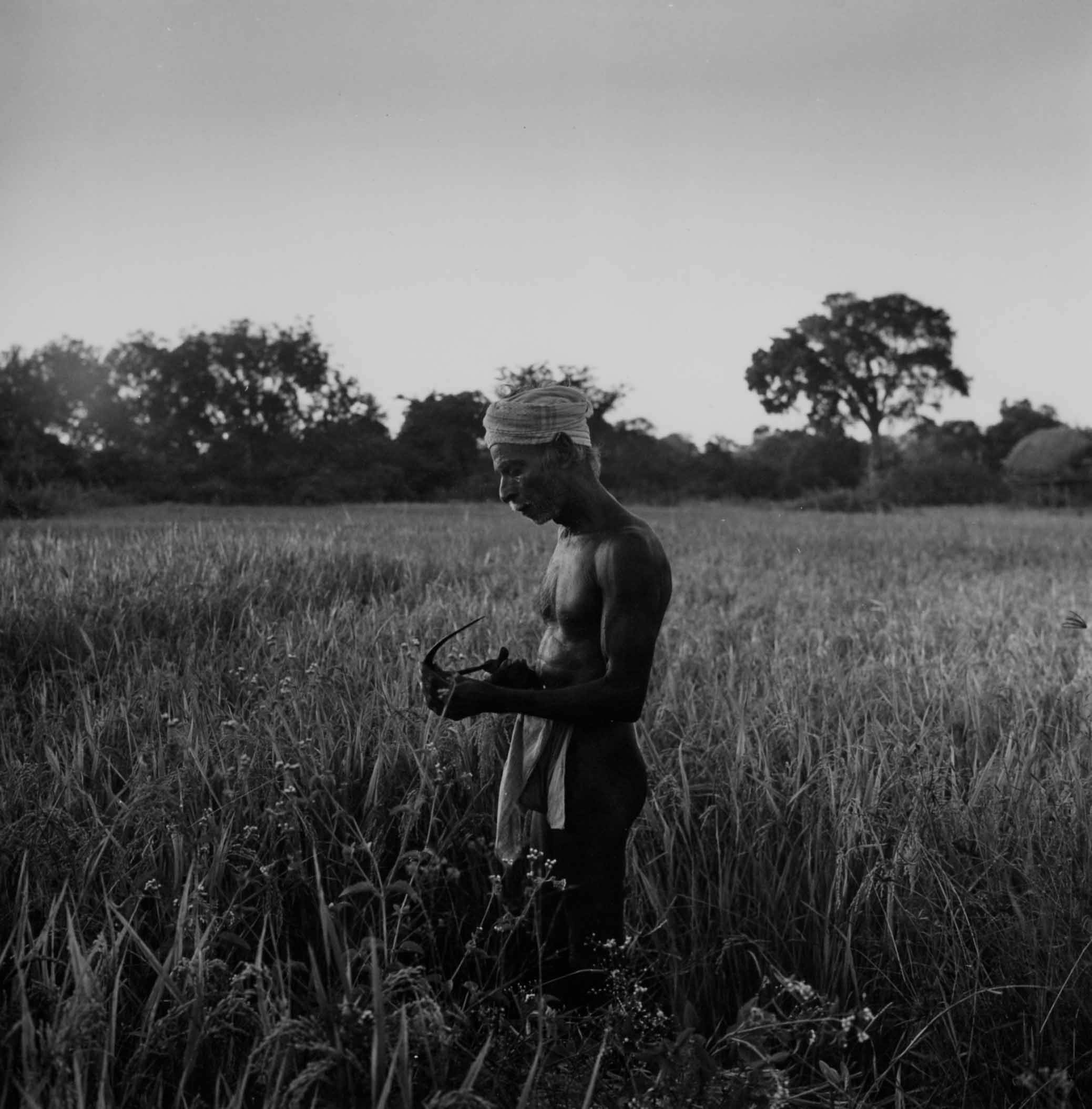
Vavuniya farmer
Another common Motif in Champion’s work is the placement of solitary human figures within landscapes, often silhouetted or turned away from camera and frequently involved in agricultural activities- Fishermen in Jaffna and Puttalam Lagoons, a farmer gazing across his land in Meddawachchiya. This device provides these picturesque, catalogue-friendly landscapes with a human context, not only breathing life into the images but also providing us with a glimpse into the particular regional relationships between the people/s and their natural surroundings, soil or sea.
A reality that cannot be ignored about this retrospective is that the period it covers aligns closely with Sri Lanka’s civil war. Unsurprisingly therefore, the spectre of war and of the country’s fragile post-war peace loom large. At times war and its impacts are inferred to rather than approached directly-war is treated as an ever-present rather than a subject in itself. This is particularly true of many of the images from Jaffna, from the razor-wire fence that cuts across our view of Jaffna Lagoon to the uncomfortable emptiness of the city after curfew. At other times Champion deals directly with the conflict, both in its corporeal brutality and its wider costs. This area of his work undoubtedly includes the most immediately evocative imagery in the exhibition: a child tagged with the words ‘wounded calamity’; the trickle of blood emerging from beneath a closed door; the twisted, blackened carnage of war. One inspired piece of curatorship is the pairing of two images. In the first, a young female LTTE (Tamil Tiger) cadre struggles to hold up her rocket launcher as if dragging around an unwanted extra-limb; in the second a young women with a prosthetic limb glares directly into the lens. This is a story in need of no further explanation.
Given the scope of this exhibition, both in terms of time scale and subject matter, there are moments when one yearns for a more contextualisation. Having said this, Sri Lanka is not a country lacking in polemicists and perhaps, in allowing the space for interpretation, Champion has purposefully sought to avoid becoming embroiled too closely in the island’s politics-to remain the artist-observer.
‘Colour of Change’, taken as a whole, provides a compelling visual record of a tumultuous period in Sri Lankan history, an insight into the essence of everyday life within the country, and, more than anything, the story of an artist’s ever changing relationship with his muse.
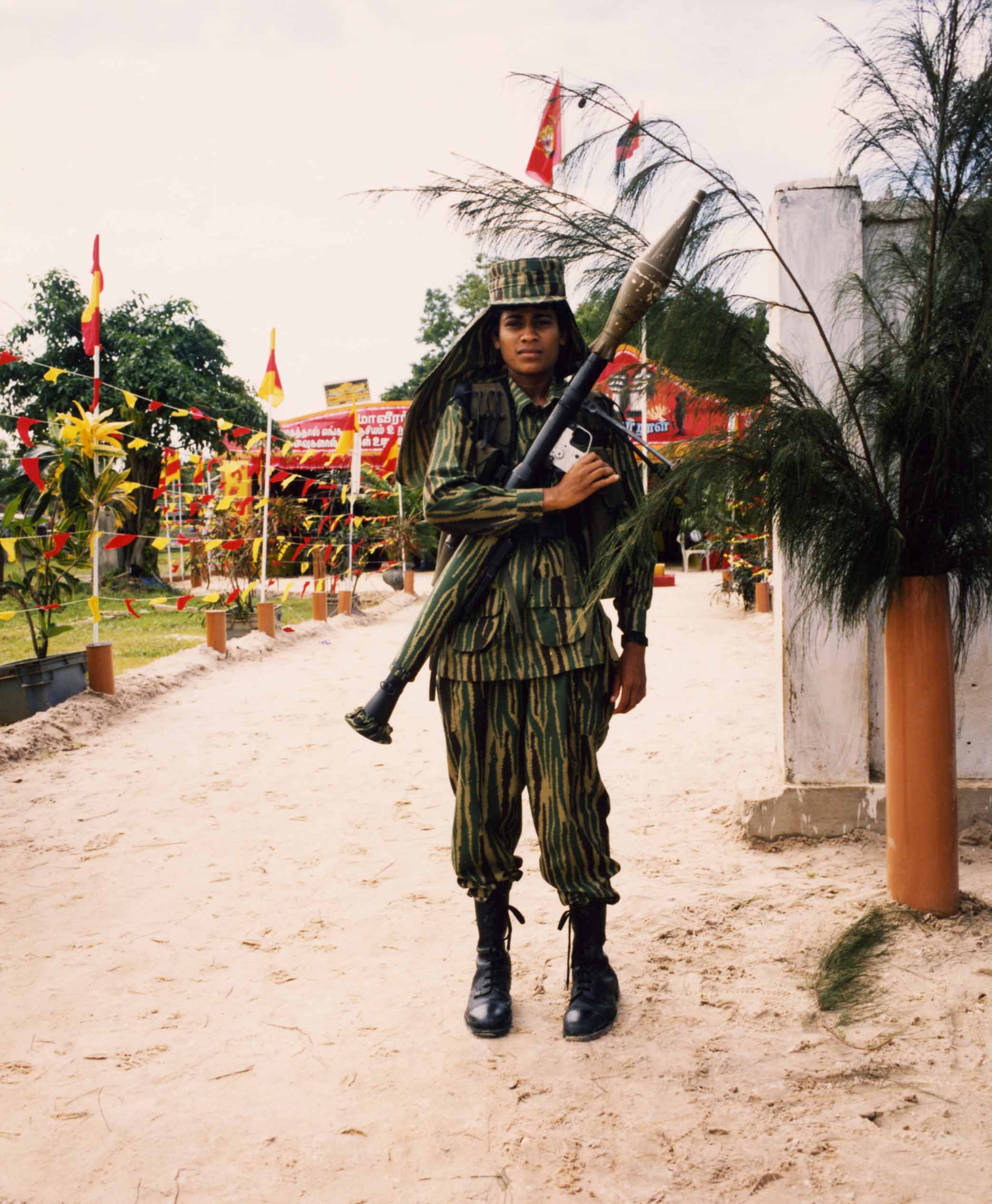
A former female LTTE cadre
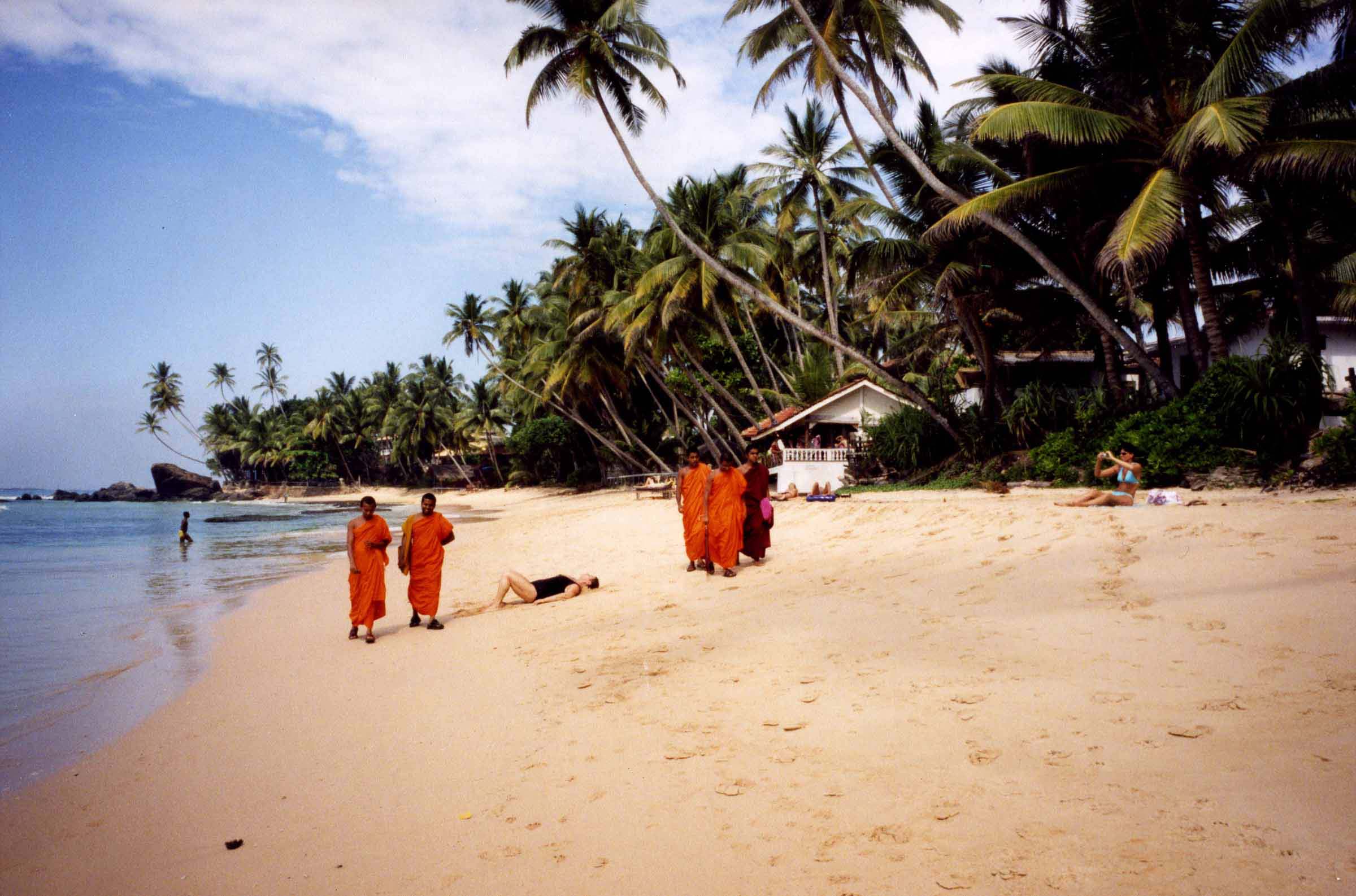
Tourists and monks on the beach

mtv 9 00pm 05 08062013
–

Harith de Mel
The Ministry of Mass Media and Information has recently proposed a Draft ‘Code of Media Ethics’. Upon reading the preliminary draft which has been made available selectively, the writer would like to highlight certain immediate concerns about this step by the Ministry. These concerns are primarily made for the preservation of an essential element of democracy; the freedom of the Media. There shall be no specific comment on the content of the Draft Code at this juncture as it would be premature even though on a perusal of the same it is much warranted.
The first concern is a matter of Professions and Ethical guidelines. Professions require and do have ethical guidelines. Ideally such is created and regulated by the profession itself. Therefore the propriety of a Ministry or Government to pass by regulation a Code of Ethics applicable to a profession must be questioned. It brings up the wider question whether any other profession can be subject to similar governmental actions. The Minister does have the power to pass regulations subject to approval by Parliament under S.30(2) of the Press Council Act of 1973 however the question remains whether the content of such regulation can ever be a code of ethics and even so a code of ethics formulated by the Ministry.
Further it must be noted that it is not in the absence of a code of ethics from the Media Profession the Government has taken this step. There is currently a ‘Code of Professional Practice (Code of Ethics)’ of The Editors Guild of Sri Lanka and Free Media Movement adopted by the Sri Lanka Press Institute which is quite comprehensive, and up to date has maintained a Press Complaints Commission for the implementation of such. Interestingly several elements of the same code has been extracted verbatim to the proposed code as well; however some of the additional ‘ethics’ proposed (especially in clause 1) cannot be said to be of a nature that any professional body would pass or that would be reasonably acceptable from the perspective of the Media Profession as it embodies very little professional insight on the workings of Media. Thus the propriety of the Government to pass it own set of ethics and superimpose such on the Media profession is clearly questionable.
The 2nd issue that arises is as to one aspect of the content of the Draft Code which is one of the graver concerns. Clause 1 contains several grounds from (a) to (m) on which ‘No Publication should be published…’ for example ‘containing material against the integrity of the executive , judiciary and legislative’. The question that arises here is can a code of ethics for media set out a restriction on content or subject matter that the media may deal with? Ethics being primarily related to the conduct of the media should if at all regulate the ‘means by which the media acts’. These restrictions do not regulate the means. They regulate the ‘end’ or the end product that is the publication itself. There is a flaw in a code of ethics regulating the end and not the means to an end. From Clause 2 onwards there are considerations of these means. For example accuracy, standards of reporting, means of investigating, confidentiality and so on are matters within an ethical code which are the means by which the media should work. If at all any restriction on the content should not be other than that which is not allowed ‘by law’ which need not be stated and is implied and is further strengthened under The Press Council Act itself and by other laws. Certain elements of Clause 1 do not carry out that objective either. Interestingly the Code adopted by the Sri Lanka Press Institute does not at any juncture have any such restrictions either, as it is itself a proper code of ethics standing within the purpose of a code of ethics.
The 3rd concern is that this particular draft code of ethics cannot be set out as regulations under the existing Law. Due to the inaction of several governments over time it has been seen that the Media is subject to Laws in a haphazard manner. The Press Council Act of 1973 deals with print media such as in the form of newspapers. However the draft code attempts to herd in Electronic Media and Websites. The only form of Law currently applicable to these forms of media are the Sri Lanka Telecommunications Act No. 25 of 1991 which by its provisions do not provide for regulations of this nature and by its preamble does not suggest any such. Therefore the Government as a first step will have to consider legislative amendments to the Press Council Act or additional legislation before it can come up with these regulations. This would make it a further issue as currently existing media forms which have been allowed to so exist will be subsequently subject to new laws and regulations. Given this clear retrospective effect this lacuna in law should not be unilaterally imposed by the government but done with extensive dialogue and consultation with the Media Profession.
The final issue is then what would be the effect if these legislative amendments are made and the draft code of ethics is passed by regulation and made applicable to all the said media above. The code uses the words ‘shall adhere’ which in law usually suggests a mandatory provision. The code however does not suggest the method of implementation and as at current there have been suggestions from the Ministry that this code of ethics will only have an effect as such and no effect whatsoever as Law. To determine the truth of this one must read the Code of Ethics along with the existing Press Council Act of 1973 which is the Core Law according to sources that will be amended to facilitate these regulations.
S.2 of the said Act creates the body called ‘The Press Council’ which has the capacity to sue. Under S.3 it is constituted of 7 members who include 6 members appointed by the President and 1 person called the ‘Director of Information’. Out of these 6 members appointed only 2 members are selected by the president from a nominated panel respectively from working journalists nominated by the Journalists Associations and a person to represent the interests of employees of newspaper businesses from such employee unions thus leaving 4 others to be selected by the President in addition to the appointee as Director of Information. Interestingly a quorum of 5 suffices for the Council functions. Therefore there is grave concern as to the independence of this Council with respect to appointment, remuneration, removal, functioning quorum and so on.
Under S.9 the council may take action by way of Inquiry. This can be done where there is ‘complaint made to it or otherwise’ and this includes inquiry by the Council of its own initiative. The reason for such inquiry can be a publication by an editor or a working journalist which commits a breach of professional misconduct or breach of the code of journalistic ethics. Therefore the proposed Code of Ethics by regulation shall clearly fall under the criteria for instigating an inquiry.
Under S.11 the Council has the powers of a District Court to summon persons, compel the production of documents and administer and subject person to an oath. Further under S.12 refusal or failure to comply with the Councils abovementioned powers amount to ‘contempt of the Council’ of which a certificate may be submitted to the Court of Appeal by the Council Chairman and can be punishable under Article 105 of the Constitution as if it were contempt of the Court itself. Any orders of the Council are also final and cannot be questioned in any court of Law and further disobeying any order made by the Council amounts to summarily triable offence at the Magistrate Court with possible fines and imprisonment.
There is therefore no doubt as to the extreme powers that might be with the Press Council and the heavy blow to be dealt to the freedom of the media with the addition of this Code of Ethics. It could be suggested that the constitution, powers and functions of such a Council be reviewed and amended. Whilst regulation of Media is also a necessary component of government it should not be done without proper checks and balances. Having a ‘Code of Ethics’ and the adjudicative powers one on the side of government would amount to a serious concentration of powers which will seriously hinder against the freedom of the media.

නව සිහල උරුමයේ නායකයාට ප්රහාරයක්
Video Rating: five / five
–
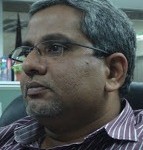
Bijo Francis
Mr. N K Illangakoon
Inspector General of Police
New Secretariat
Colombo 1
SRI LANKA
Fax: +94 11 2 440440 / 327877
E-mail: [email protected]
Dear Mr. Illangakoon,
Re: Cases of torture perpetrated by officers of the Sri Lankan Police
I am writing to bring to your notice a letter the Asian Human Rights Commission wrote to His Excellency the President of Sri Lanka on the use of chilli by police officers for torturing suspects they are interrogating. I am also bringing to your notice three extremely brutal cases of torture reported from Sri Lanka recently: Madawala Maddumage Don Aruna Nilupul Indika, a reputed interior decorator was arrested on the basis of a false complaint and subjected to severe torture by way of the application of the juice of chillies which was forced into his eyes, penis and anus. The second case was that of Mr. Chandila Padmakumara Gurusinghe who was also tortured with chilli and threatened with sodomy. The third was that of Kopiya Waththage Don Chaminda Priyantha Kumara who was tortured by the use of a wooden mallet on his testicles.
In all these three cases there are the following features.
- There were no reasonable grounds for the arrest of these persons.
- At the moment of arrest they were not informed of the reason for their arrest, thus violating the Constitutional guarantee of the right to be informed of the reason for attest.
- There was no reasonable questioning at the time of arrest or after they were brought to the police station.
- The beginning of the interaction with the suspects was by torture. While the torture was ongoing they were asked about information on what the police suspected them of with the view to obtain information from the suspects themselves about what they might have done.
- The methods of torture were inhumane such as forcing the suspects to remove their clothes, the application of chilli and/or the beating of the testicles with blunt instruments and suspending them by the wrists from the ceiling and the use of extremely filthy language.
- At the end of the ordeals what the police found was that the persons were completely innocent of the crimes that the police suspected them of having committed.
- Despite of all this in two instances fabricated charges were filed.
I am attaching the letter written to His Excellency the President as well as the reports of complaints made by the persons who were subjected to these ordeals.
As you are well aware the practice of torture and the use of extremely brutal methods are a common factor in police interrogations in Sri Lanka. This is despite of the constitutional provisions guaranteeing citizens protection against torture and the provision of the law under the CAT Act, No. 22 of 1994 which criminalised torture and prescribes 7 years of rigorous imprisonment and a fine of Rs. 10.000/= against any offender.
One of the main reasons for the widespread use of torture is the stopping of investigations under the CAT Act and the prosecutions on the basis of that law. At present Act No. 22 of 1994 is a law that is deliberately not implemented in Sri Lanka.
You will also admit that without the acquiescence of high ranking police officers from the OIC’s up to ASPs, SSPs and DIGs this widespread practice cannot take place. Therefore it is a valid assumption that as a matter of policy torture is allowed and encouraged to be done by police officers despite of constitutional provisions and criminal law provision prohibiting torture. When the highest ranking police officers are complicit in the violation of the constitution and the criminal law what hope can there be for the protection of the citizens and the enforcement of the rule of law.
The common excuse seems to be that the policing establishment believes that it is not equipped with the necessary resources, including adequate financial resources, for the proper enforcement of their duties and therefore resorting to barbaric and illegal methods is justified as the overall aim is the prevention of crime. An important institution such as the police, if it assumes that it cannot abide by the law which it is supposed to enforce, is a manifestation of an extraordinary crisis in the country.
As the highest ranking police officer in Sri Lanka it is your duty, together with other high ranking officers, to bring to the notice of the executive and the legislature the inadequacies of resources and financial allocations you suffer from, if such is the case. However, this should not be used as an excuse to violate the constitution, the criminal law of the country and to expose the citizens to such extraordinary cruel and illegal behaviour on the part of the country’s law enforcement officers.
We earnestly urge you to take this matter seriously and:
- Take steps to ensure investigations under the CAT Act, No. 22 of 1994 into the complaints of torture and ill-treatment through a special unit of inquiry of the Criminal Investigation Division as this used to be done before it was deliberately discontinued.
- To discuss with the highest ranking officers of the police the nature of command responsibility they owe within the policing system and the consequences of the failure to carry out such responsibility.
- Issue written instructions to reinforce the constitutional criminal law provisions against torture.
- Take disciplinary action including the dismissal of officers who have practiced such brutal actions.
Thank you.
Yours sincerely,
Bijo Francis
Executive Director
Asian Human Rights Commission
Attached: Letter to His Excellency, President Mahinda Rajapaksa
SRI LANKA: A reputed Interior Decorator is severely tortured by officers of Matugama Police at the instigation of a lawyer and her husband
SRI LANKA: Officers of the Karandeniya police torture and threaten to sodomize businessman, insulting him about his ‘low’ caste origin
SRI LANKA: Officers of the Kalutara South Police Station beat a man’s testicles with a wooden mallet

–
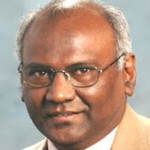
Prof S. Ratnajeevan H. Hoole
The Law used to Advance Injustice
I fled Sri Lanka first under LTTE death threats in March 2006 and a second time in August 2011 after detailing election malpractices in Pitfalls in the President’s Alliance with the EPDP – A Visit to Kayts on Elections Day (Leader 24.07.2011). If I had been untruthful, the EPDP’s Minister Devananda had recourse to defamation charges; instead he abused his powers and got the police to collude on trumping up criminal charges. This is not uncommon in a country where the police are mere tools of the state, used even to murder opponents. The law is frivolously used. [For example, writer R. Tharmaratnam of London recently reported how EPDP Lawyer Rengan Devarajan filed a case against building supervisor Mr. G. Yogaratnam at the BARNET Courts in the UK. On 7 May 2013 when the case was called at great cost to Yoganathan, Devarajan faxed from Jaffna at the last minute claiming he had mistakenly thought the case to be fixed for June. No explanation having been proffered for suddenly remembering, the perceptive judge dismissed the case. That is how the EPDP uses the law against opponents].
Being Attacked in Exile
I presently teach at Michigan State University as a professor. I keep up my interest in Sri Lanka and write regularly of the government’s and its Tamil stooges’ work against Tamils. My articles usually appear in the Lankan print media so that they are subject to the legal system, however eviscerated and in its death throes.
I recently commented on Devananda’s weak commitment to devolution and his willingness to work with Sinhalese extremists in withdrawing the powers of the Provincial Councils prior to the Northern elections. I have commented on his friend K.T. Rajasingham who has been reported (Leader, 25.11.2007) as asking the President for funds to run a propaganda TV station and news portal for him. I have also commented on the government fomenting Buddhist fundamentalism through sham outcries against beef stalls and liquor shops, while allowing Tamil paramilitary stooges to run liquor stalls in the Vanni, keeping them open even on Full Moon Poya Days.
These articles have angered the Devananda-Rajasingam duo. K.T. Rajasingham went so far as to call up my friends after my article on his Asian Tribune as a propaganda sheet. He claimed that I am interested in the University of Jaffna Vice Chancellor’s post coming vacant in March 2014, and have therefore apologized to Devananda and asked for his blessings to return for the position.
I emphatically deny this. I have not communicated once with him over 2 years. In my eagerness to serve my beleaguered Tamil people, I once thought that I could do some good by leading the university. But that experience diminished me. To hold even the most minimal administrative position in a Sri Lankan university one has to submit to the murderers in authority. An engineer cannot function ethically in a job where the political authorities are implicated in murder and corruption of all sorts. Though I may still wish I could do some good for the University of Jaffna, I cannot compromise my personal integrity by dealing with the unsavory characters who control appointments. I will return to Jaffna when I am ready to retire.
Devananda’s Demand that I be Sacked
With Rajasingham’s intrigues failing, on 07.06.2013 Devananda lengthily wrote a complaint with strategic untruths to Prof. T.H. Curry, the Associate Provost of Michigan State University. Devananda introduced himself as MP and longstanding Cabinet Minister for four terms, Secretary General of the EPDP and continuously [sic.] elected as MP. He alleged that I was appointed VC on his recommendation despite coming third in the Council elections; that after my appointment, I made a deal with LTTE terrorists and on LTTE instructions fled without assuming my duties; and that I later, returned and applied again, but this time he refused to interfere because “such interference would be ultra vires [sic.] and undemocratic.”
Devananda continued, after the person with the highest votes was appointed, I wrote articles “containing fabricated and concocted facts attributed to [him] and [his] party … for the purpose of tarnishing [his] image and [his] party’s popularity;” that in “one unsubstantiated, baseless, defamatory piece of writing” I had insulted a section of the society supportive of him “in an obscene language [sic.] instigating social disharmony.” He went on that “such provocative writing that would cause to break the public peace [sic.] is a criminal offence punishable under section 484 and 485 [sic.] of the penal code. Accordingly the law enforcement authorities filed a lawsuit against him in the magistrate’s court of Kayts, Jaffna. … On being served with the notice to appear before the court … he fled the country [sneakily] and sought sanctuary in the US.”
Devananda ended his letter saying “I respectfully request you to reconsider your decision to continue employing a person who has been issued with an open warrant for a criminal offence. …Further by allowing him to use the office of your university [sic.] as a protective cover to carry out malevolent activities against others is in violation of the moral code of conduct and ethics of a high ranking institution like Michigan State University.” The letter, he says, was copied to “all Board of Trustees [sic.]”, Vice President and Secretary of the Board of Trustees, President [sic.],” my Dean and Department Chairperson, and numerous others, including the US Embassy and the Sri Lankan Embassy in Washington DC.
Michigan State University Responds
The letter was replied by Attorney Michael Kiley, Associate General Counsel for the university on 10.06.2014:
“Secretary General Devananda: I write regarding the commentary about Dr. Hoole that you addressed to associate Provost T. Curry in an email that was copied to scores of other persons.
“The essence of your long complaint is that Dr Hoole is the subject of a criminal warrant because he authored a “writing [that] insulted a section of the society supportive of [you] in an obscene language instigating social disharmony. Such provocative writing . . . is a criminal offense. . . .”. You offered no factual support for your characterization of Dr. Hoole’s language as “obscene”. More salient, the asserted bad conduct would in this country implicate the exercise of “free speech”. Such is protected, not criminalized. Dr Hoole may or may not have published offensive comments at your expense, but such would have no bearing on his status at MSU.
“You asserted that Dr Hoole fled the jurisdiction. (Some would make a similar claim directed at you in connection with kidnapping and other unlawful conduct affecting Stanley and Mary Allen in 1984, the Choolaimedu incident in 1986, and the allegations stemming from Kilpaul, Madras in 1990. Michigan State University will not presume to sort through the particulars of personal and/or political differences between you and Dr. Hoole. There is no properly issued court order emanating from a tribunal recognized as having jurisdiction here. We decline to credit assertions having an adjudicative character.
“I wish you well in your work as Minister of Traditional Industries & Small Enterprise Development.”
Advertising their Own Evils
It is a sorry state of affairs when a minister claiming lengthy experience does not understand democracy. I did not see these letters until after Mr. Kiley replied. As expected of those behind a strong research institution, Counselor Kiley quickly researched facts and found out who the Minister is. By his behaviour when Sri Lankan freedoms are under scrutiny by the UNHRC, and by involving the State Department, Devananda has attracted attention to the evil nature of our government, leading to wider knowledge of his skullduggery in the Allen couple kidnapping and the Choolaimedu and Kilpaul incidents. When such a person is a longstanding cabinet minister, what is the world to think of the genocide allegations pending inquiry?
Minister Devananda has now written again, asking the university’s legal counsel by what authority he had replied the letter to the Associate Provost. That is excellent advertisement for President Rajapaksa and his arrogant cabinet – that the Rajapaksa cabinet includes men wanted for murder and kidnapping as senior ministers who are associated even with the kidnapping of two US citizens.

සිරස සුපර් ස්ටාර් නිව්ස්ෆස්ට් මැදිරියට
Video Rating: 5 / 5
Video Rating: / 5